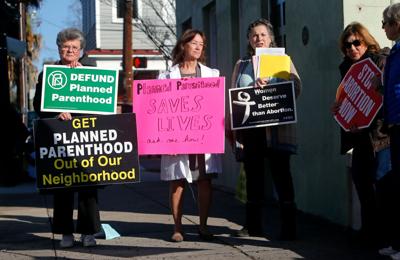Triggering praise, criticism and some confusion, Gov. Henry McMaster issued an executive order Friday cutting off all public funding to health care providers affiliated with abortion clinics in South Carolina.
In the order, he also directed the South Carolina Medicaid agency to seek permission from the federal government to exclude abortion clinics from the state's Medicaid provider network.
"There are a variety of agencies, clinics, and medical entities in South Carolina that receive taxpayer funding to offer important women's health and family planning services without performing abortions," McMaster said in a press release about the order.
"Taxpayer dollars must not directly or indirectly subsidize abortion providers like Planned Parenthood," he added.
Three clinics offer elective abortions in South Carolina, but only one of them is a Planned Parenthood clinic, in Columbia. Federal law already prohibits Medicaid money from being used to pay for abortions, with exceptions for cases of rape, incest or when the mother’s life is in danger.
Dr. Raegan McDonald-Mosley, the chief medical officer of Planned Parenthood Federation of America, issued a statement Friday vowing "(t)his is not over."
In South Carolina, she said 4,000 patients receive birth control, cancer screenings and other preventive care at Planned Parenthood clinics each year.
"And we’ll leave no stone unturned to protect our patients’ access to health care," McDonald-Mosley said.
Planned Parenthood did not expressly threaten legal action on Friday but it's unclear if McMaster's executive order would withstand such a challenge.
A law signed by President Donald Trump in April allows states to block abortion clinics from receiving money through federal family planning grants.
But in February, a federal judge temporarily stopped an attempt in Texas to defund Planned Parenthood, allowing the group's clinics to continue treating Medicaid patients.
The Texas attorney general recently asked the U.S. Court of Appeals to overturn that ruling.
The exact language of McMaster's executive order bans government money from "any physician or professional medical practice affiliated with an abortion clinic and operating concurrently with and in the same physical, geographic location or footprint as an abortion clinic."
Dr. Scott Sullivan, the director of maternal-fetal medicine at the Medical University of South Carolina, wasn't sure Friday if, or how, the new order might affect the hospital. MUSC physicians will only terminate a pregnancy with a patient's consent when they deem the procedure medically necessary.
"I asked hospital legal to review (the order) this morning," Sullivan said. "I am concerned obviously."
While MUSC receives millions of dollars from Medicaid each year, Planned Parenthood clinics receive relatively little. Vicky Ringer, the South Carolina director of public affairs for Planned Parenthood South Atlantic, called McMaster's order "a political stunt" and accused the governor of wasting taxpayer "time and money on scoring political points."
Likewise, Ann Warner, the CEO of the Women's Rights and Empowerment Network in Columbia, issued a statement blaming McMaster of prioritizing politics.
"We cannot sit quietly and allow this to happen. We need to speak out," Crawford said. "We need to look beyond political debates and remember that real people in our communities are going to get hurt if this executive order is allowed to stand.”
McMaster's order echoes a similar call from Lt. Gov. Kevin Bryant in June to defund the group. Bryant, a social conservative, recently entered the GOP primary field to challenge McMaster in the 2018 governor's race.
"I've been a pro-life activist my entire life and will continue to be," Bryant said at the time.
Planned Parenthood, which operates clinics in Charleston and Columbia, only offers elective abortions at the Columbia office.
The Greenville Women's Clinic in the Upstate and the Charleston Women's Medical Center also offer the elective procedure through 14 weeks of pregnancy – roughly the beginning of the second trimester.
State law bans providers from performing an abortion for any reason after 20 weeks of pregnancy, even if the fetus has been diagnosed with a likely fatal defect in the womb. That law, signed by former Gov. Nikki Haley in 2016, makes no exceptions for cases of rape or incest.
A receptionist at the Greenville clinic said the office doesn't file insurance of any kind and receives no money from the government. A receptionist at the Charleston clinic said the new order won't impact the West Ashley facility.
Data provided by the state Medicaid program, which costs more than $7 billion a year to administer, shows Planned Parenthood South Atlantic received $72,867 from South Carolina Medicaid during the 2016 fiscal year. Most of that money was used to provide family planning services for Medicaid beneficiaries, such as prescribing birth control. The abortion clinics in Greenville and Charleston received no money from Medicaid, a spokeswoman for the agency confirmed.
While the order may have little impact on the state budget, Cheryle Freiberger, a local anti-abortion activist, applauded McMaster on Friday.
"The government should not be supporting (abortions)," Freiberger said. "We want abortion to be unthinkable."







